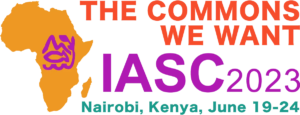Call for papers: IASC 2023 Panel ‘Leveraging computational methods to decode institutions’
We are pleased to announce the acceptance of the panel “Leveraging computational methods to decode institutions — implementing computer science methods to study commons” at the IASC conference 2023 in Nairobi.

The intention of this panel is to collate state-of-the-art approaches to institutional analysis that introduce or apply computational methods to draw novel insights. The panel is explicitly agnostic about employed methods/techniques (e.g., ML-based approaches, QCA, Modelling), as well as the nature (e.g., field, policy) and structure (e.g., structured/unstructured; temporal, spatial; formats, etc.) of data. Positioning this panel as a forward-looking forum, we invite for contributions that are at different stages of development, as long as the method and insights or analytical benefits are clearly communicated and may have the potential to benefit the wider community of researchers and/or practitioners (and beyond). Insights may focus on any part of the analytical process, including fostering the sourcing and preprocessing of data as well as the processing, evaluation, or interpretation. It may further include conceptual work and invites for submission by researchers and practitioners alike. The full panel abstract can be found at the bottom of this page.
The submission is available under the following link (Panel 5.3): https://2023.iasc-commons.org/piotnetforms/abstract-submission-sub-theme-5-modelling-and-multi-methods-approaches-in-polycentric-commons-systems/
The submission deadline is 12th December 2022.
If you have questions regarding the panel, please do not hesitate to get in touch with any of the organizers.
Organizers:
Bartek Pieliński (Mail: b.pielinski@uw.edu.pl; Web: pielinski.info)
Christopher Frantz (Mail: christopher.frantz@ntnu.no; Web: christopherfrantz.org)
Panel Abstract:
The panel is dedicated to share research implementing computational methods for extracting, annotating, and analyzing strategies, norms, and rules or any forms of information attempting to regulate agents’ behavior. The panel aims to gather researchers from different disciplines, including computer science, computational social science, as well as social science more broadly, who rely on specific computational methods to develop a better understanding of how institutions govern social interactions, especially those involving commons. However, to date efforts to collate an exposition of different computational approaches is limited. The panel thus encourages the knowledge transfer across different (sub)disciplines, and specifically invites contributions that relate to:
- Novel theoretical or conceptual frameworks studying commons by relying on computational methods;
- Empirical work by both researchers and practitioners exploring opportunities of computational techniques (whether existing or novel) in the field;
- Research focusing on the development of technological approaches that illustrate or unleash novel analytical opportunities, or advance existing techniques for the study of the commons specifically, and institutions more generally.
For all the highlighted directions, the panel is agnostic about the nature of the underlying data (e.g., qualitative, quantitative), and specific methods (including formal methods) used in the study. Where relevant, researchers are further invited to specifically speak to the challenges of the employed techniques as a basis for identifying best practices regarding the selection and application.